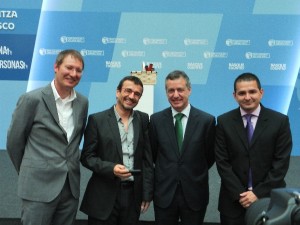published by: | 03 July 2013 | news
The three permanent Ikerbasque Research Professors affiliated with Universidad de Deusto met with Lehendakari Iñigo Urkullu during a government reception for Ikerbasque Research Professors and their families who moved to the Basque Country to help strengthen its science landscape.

Ulf-Dietrich Reips, Gonzalo Bacigalupe, Iñigo Urkullu, Juan Arango
Governor Iñigo Urkullu is also a former student of Universidad de Deusto.
published by: A. Jiménez | 23 March 2013 | news
A joint multi-national proposal involving our group, “A Research infrastructure for the Study of Archived Web materials”, has been put by EU Consultation on Research Infrastructures, Topics for Integrating Activities on the list of projects of “High potential” and also with “merit for future Horizon 2020 Research Infrastructure Actions”. We consider this to be a very qualified prequalification as the evaluation procedure has followed the rigorous standard FP7 evaluation procedure.
Find the evaluation outcome of this first step at the European Commission’s website: http://ec.europa.eu/research/infrastructures/index_en.cfm?pg=consultation (the project is classified in the Mathematics and ICT category as ‘ICT02’).
published by: A. Jiménez | 31 January 2013 | news
According to preliminary calculations based on citations listed by Google Scholar, the 2012 journal impact factor of the International Journal of Internet Science will be 5.8 or higher.
To calculate the 2012 impact factor, number of articles published in the two previous years is divided by the number of cites in 2012 to items published in 2011 (4) and 2010 (36). This calculation of Cites to recent items / Number of recent articles arrives at 40 / 7 = 5.8 .
As usual, the real 2012 journal impact will be higher, as some 2012 publications have not yet appeared in the databases.
published by: A. Jiménez | 18 December 2012 | news
The Scientific Advisory Board of Ikerbasque (the Basque Foundation for Science) has awarded a one year full Visiting Professorship to Prof. Gary McClelland, a top level full professor coming from the University of Colorado Boulder and the iScience research group in the competitive call for Ikerbasque Visiting Professorships. Prof. McClelland and iScience group will work on Interactive Web-Based Graphics in Support of Scientific Publications.
The position is co-funded by a Marie-Curie Action “FP7-PEOPLE” grant from the European Commission.
For a full list, see Ikerbasque’s Awarded Visiting Professors

